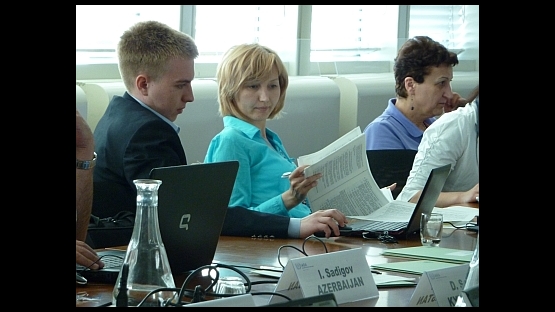Under the auspices of the TC programme for the Europe region (TCEU) and in close collaboration with the Department of Nuclear Safety (NS), a School of Drafting Regulations on Radiation Safety is again taking place at the IAEA’s headquarters in the Vienna International Centre. The School started work on 2 May and will continue throughout the month. Participants are drawn from Russian-speaking Member States, including Armenia, Azerbaijan, Belarus, Georgia, Kazahkstan, Kyrgyzstan, Lithuania, Tajikistan and Ukraine. International experts have been recruited from Bulgaria, Cuba, Lithuania, Russia, Slovenia, Ukraine and the United States.
The school is the second in an on-going series of Schools organized within the scope of TC project RER9096 to expedite the drafting of new national radiation safety regulations (or the revision of regulations already existing) with a focus on ensuring compatibility to the fullest extent possible with the relevant IAEA safety requirements. Where appropriate, other Standards, such as EC Directives, are also taken into account. IAEA Technical Officers from the Division of Radiation, Transport and Waste Safety (NSRW), Division of Nuclear Installation Safety (NSNI), the Office of Nuclear Security (NSNS) and legal staff from the Office of Legal Affairs (OLA), together with international experts, are available throughout the month to provide guidance on the development of comprehensive regulations on radiation safety. The participating international experts act mainly as mentors. Working with IAEA Technical Officers and the School’s Coordinator (also an international expert) they lead the drafting process, tutor the participants and provide advice to refine the emerging drafts.
The aim of this event is to proactively assist Member States with the drafting and revision of national regulations, namely radiation safety and cross-cutting nuclear safety and security matters. By the end of the month, each participant will have drafted amended regulations or outlined new regulations in accordance with IAEA requirements, available for further development and completion in their home countries. The workshop will support the preparation of national implementing regulations on regulatory control for radiation sources, including regulations for authorisation, inspection, enforcement, safety and security of radioactive sources, import and export controls within thematic areas concerned including transport, waste, occupational, medical and public exposure.
At the end of the School, it is expected that the participants will have gained sufficient knowledge and expertise to enable them to ensure regulations are properly framed in the future, always within the national legislative framework, and also in line with international safety standards and best practices.
Each session of this continuing programme of the School is designed to accommodate a large number of participants from Member States that share certain elements in common, such as language, regulatory traditions or the current status of their regulatory infrastructures. This allows participants to work together in synergistic groups, and to exchange knowledge, experience and expertise. Thus, the School serves as a prime forum for information sharing, where participants discuss their concerns, and neighbouring countries use their neighbours’ experience in the creation or enhancement of their own regulations, particularly where a harmonised approach is desirable.
Due to the success of the first Drafting School in 2010, it is now planned that Schools will take place on a regular basis in the future within the scope of relevant TC projects, each one tailored to specific requirements or themes. It is anticipated that the next School will be held by year end 2011 or early 2012.
The initiative significantly accelerates regulatory document drafting, and increases draft quality due to the unique possibility to consult simultaneously not only with other participating Member States and international experts, but also with numerous staff members from across the IAEA.


